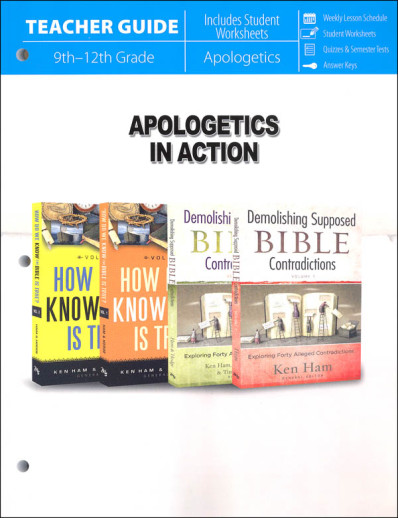We use cookies to make your experience better. To comply with the new e-Privacy directive, we need to ask for your consent to set the cookies. Learn more.
Apologetics in Action Teacher Guide
Teacher Guide provides teaching tips, weekly lesson schedule, student worksheets, quizzes, semester essay prompts and answer keys. Worksheets vary and include essay summaries, open-ended questions focused on self-reflection, and fill-in-the-blank questions. Building on resources from noted apologist, Ken Ham, this guide from Master Books provides a practical resource to prepare our young adults for the challenges they will face whether in college or the work force. Reproducible for homeschool families or small classrooms (less than 10 students), 3-hole punched.
Features: Each suggested weekly schedule has two easy-to-manage lessons that combine reading, worksheets, and vocabulary-building opportunities. Worksheets, quizzes, and tests are perforated and three-hole punched materials are easy to tear out, hand out, grade, and store. Adjust the schedule and materials needed to best work within your educational program. Space is given for assignments dates. There is flexibility in scheduling. Adapt the days to your school schedule.
Workflow: Students will read the pages in their book and then complete each section of the PLP. They should be encouraged to complete as many of the activities and projects as possible as well. Tests are given at regular intervals with space to record each grade. If used with younger students, they may be given the option of only choosing activities or projects of interest to them and taking open book tests.
Calculating Credits: This course should take between 60 to 90 hours to complete, depending on any additional hours spent on added research, essay writing assignments, or suggested lab activities, if assigned. Elective courses that take 60 hours are commonly assigned ½ credit, while those 120 hours or more are assigned a full credit; core courses require over 150 hours for a credit. Based on whether this is being used as a core or elective course, make your final credits calculation based on the total hours of coursework completed in the year.
Christians face a number of faith-related questions each day and sometimes it's hard to know where to go for the answers. These books are a collaboration of answers and thoughts given by some great defenders of the faith: Bodie Hodge, Jason Lisle, John MacArthur, and Ken Ham (to name a few). They address 20 important issues in Volume 1 and over 30 in Volume 2, such as: Is the Bible reliable? Did miracles really happen? Should we interpret Genesis literally? Where did God come from? Has Noah's ark been found? These questions (and many more) are addressed, and scriptural support is given for the answers offered. These volumes provide answers and support as you ask questions and try to answer questions posed by friends or family. The information is clear and written in terms that help you explain to others the answers to some tough questions that are foundational to the Christian faith. 300-350 pgs, pb. ~ Donna
| Product Format: | Binder |
|---|---|
| Brand: | Master Book Publishers |
| Grades: | 10-12 |
| ISBN: | 9781683440468 |
| Length in Inches: | 10.875 |
| Width in Inches: | 8.375 |
| Height in Inches: | 0.5 |
| Weight in Pounds: | 1.3 |

